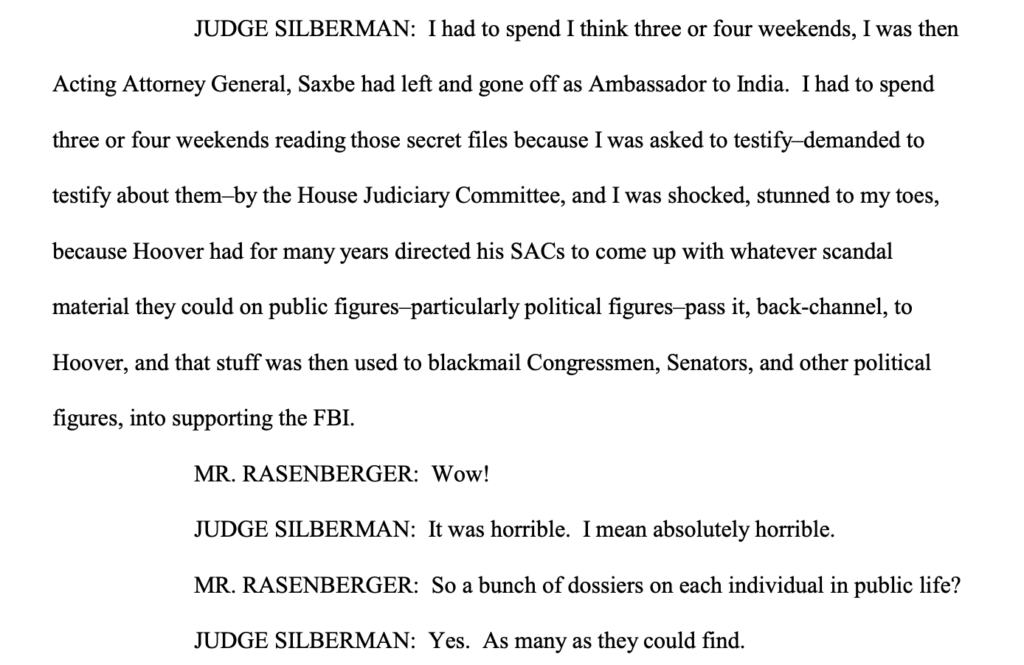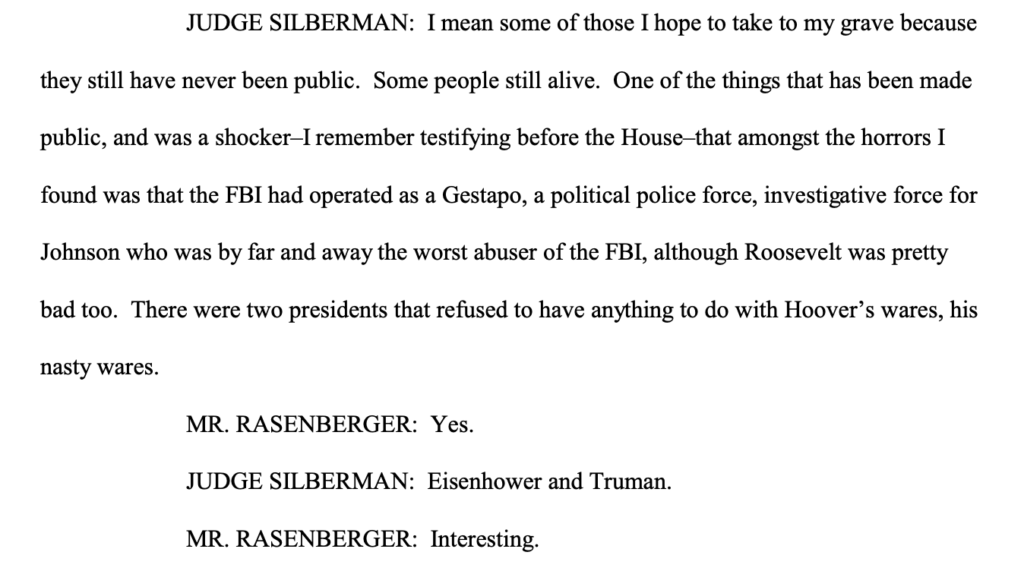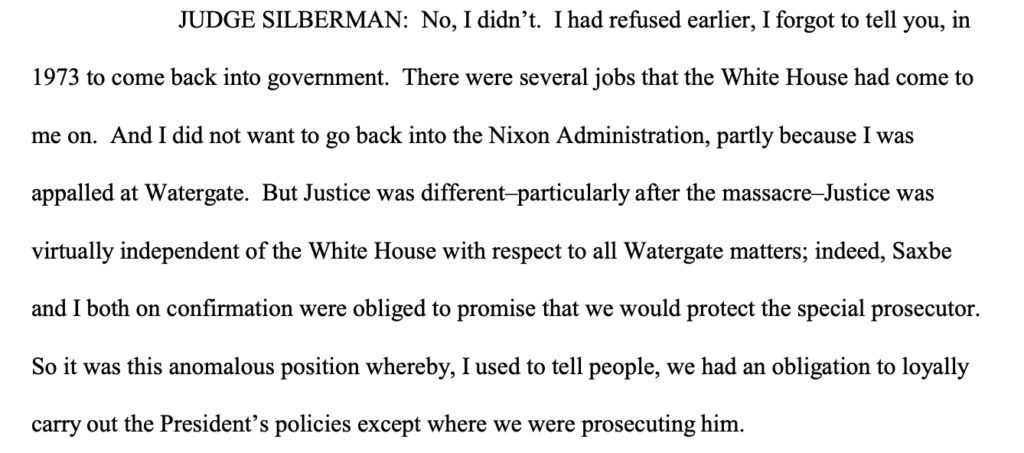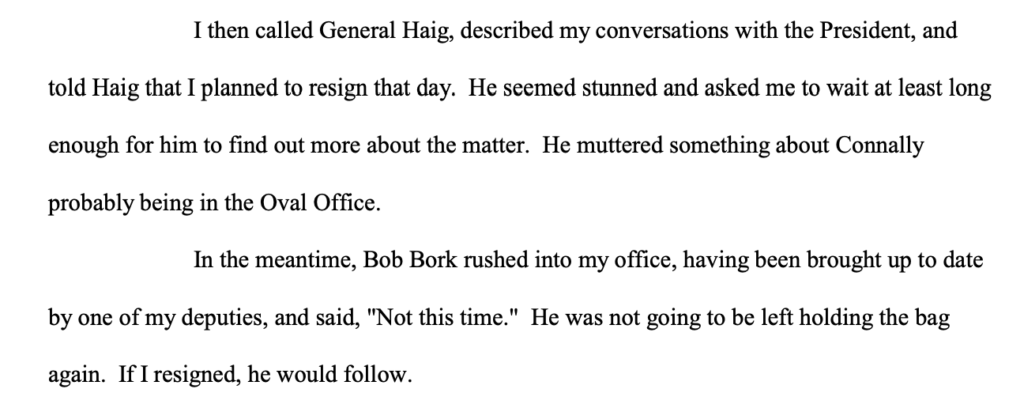The Most Intimidating Judge I Ever Met: Reflections on Judge Laurence Silberman
Judge Laurence Silberman of the D.C. Circuit has passed away. As I’ve reflected on the life of this remarkable judge, the word that has kept coming into my mind is “intimidating.” That isn’t the sort of word that often makes into a remembrance but I can’t think of a better one. I’ve met lots of judges in my life — many with gravitas. But I never met another judge like Silberman.
To be clear, I was not intimidated by Judge Silberman because he was mean spirited. To the contrary, although — to be sure — he did not pull his punches, he was a gentleman in all my interactions with him. Nor was I intimidated by him simply because he was smart, though he had a world-class intellect.
No, what set Silberman apart was the combination of his horsepower with his extraordinary experience. He was an expert in labor law, which is why he served as Solicitor of Labor and Undersecretary of Labor. Silberman, however, then served as Deputy Attorney General and Ambassador to Yugoslavia. And even as a judge, he co-chaired the Commission on the Intelligence Capabilities of the United States Regarding Weapons of Mass Destruction.
These types of positions would give anyone experience. But for Judge Silberman, it wasn’t just the titles — it was what he did with them. At the Department of Justice, for example, he reviewed J. Edgar Hoover’s files and could say things like this (from his remarkable oral history at the D.C. Circuit Historical Society):

…

…

There is a lot more in Judge Silberman’s oral history about Hoover, but you get the idea: Silberman understood in his bones how governmental power can be abused.
Judge Silberman, of course, additionally played a major role in Watergate. He discussed this experience in his oral history, too. Here is a sample:

…

Judge Silberman was also a force at the Supreme Court. Everyone knew that Silberman was close with Justice Antonin Scalia (indeed, I don’t think it is in print, but I’ve heard Silberman recount advising Scalia against pursuing the Vice Presidency; Scalia also announced — and this is in print — that he had “no closer friend in the world“). He also played a central role in the life of Justice Clarence Thomas, even encouraging him to be a judge; Thomas has stated that “Judge Silberman had the earliest and deepest influence on me as a judge.” And, of course, Justice Amy Coney Barrett clerked for Silberman.
I first met Judge Silberman when I was clerking for Judge Janice Rogers Brown. She invited him to her chambers to speak with her clerks. The conversation, as I recall it, was about two things: Chevron deference and his time as ambassador. As to Chevron, he vigorously defended it — as he had done for decades. I remembered that conversation when, a few years ago, he wrote this remarkable concurrence:
Much of the recent expressed concern about Chevron ignores that Chevron’s second step can and should be a meaningful limitation on the ability of administrative agencies to exploit statutory ambiguities, assert farfetched interpretations, and usurp undelegated policymaking discretion. This case presents just one example of those kinds of agency tactics. There are others. …
To be sure, some have lamented that as a practical matter, under Chevron, either the case is decided at the first step or the agency prevails once it receives deference under step two. But that is not what the Chevron case called for. Chevron itself involved a phrase “stationary source” that was not at all defined and clearly could equally refer to (a) a factory complex, or (b) a specific emitter of pollution. But it would have been unreasonable to refer to (c) a whole city. Yet too many times agencies have taken advantage of an ambiguity to pursue a (c), (d), or (f) interpretation that accorded with policy objectives. ….
Unfortunately, the Supreme Court for some time after Chevron contributed to the step one winner-take-all narrative by neglecting to rely on step two even when it was really called for. Take for example MCI Telecommunications Corp. v. AT&T Co., 512 U.S. 218 (1994), in which Justice Scalia—perhaps the foremost expositor of Chevron—used statutory structure and context, much like Judge Edwards does in our case, to demonstrate that the FCC’s reliance on the word “modify” was unacceptable. But he never conceded that the word “modify” was ambiguous, which it was.
Subsequently, however, in AT&T Corp. v. Iowa Utilities Board, 525 U.S. 366 (1999), Justice Scalia implicitly relied on step two. He concluded that because the agency failed to interpret the terms of the statute “in a reasonable fashion,” the rule must be vacated. Then, in City of Arlington v. FCC, 133 S. Ct. 1863 (2013), he admonished that “where Congress has established an ambiguous line, the agency can go no further than the ambiguity will fairly allow.” And most recently in Michigan v. EPA, 135 S. Ct. 2699 (2015), when invalidating agency action under step two, he was more explicit still: “Chevron allows agencies to choose among competing reasonable interpretations of a statute; it does not license interpretive gerrymanders under which an agency keeps parts of statutory context it likes while throwing away parts it does not.”
We have at times been careful to apply step two review vigorously. See, e.g., Goldstein v. SEC, 451 F.3d 873 (D.C. Cir. 2006). This is just such a case where the agency’s original claim for Chevron deference—before the agency’s control switched—would have been rejected at Chevron step two; a muscular use of that analysis is a barrier to inappropriate administrative adventure.
That criticism of Chevron — and proposal for a path forward — carried extra weight with me because it came from Judge Silberman.
Much more could (and should) be said about Judge Silberman. His opinions were always worth reading. I learned something every time I heard him speak. I’m also sure that whenever I think about him for the rest of my life, I’ll still be intimidated. He was a great judge and an even greater American. May he rest in peace.



